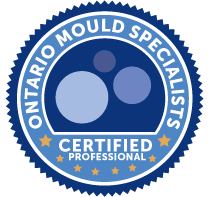
Mould can have health impacts ranging from minor allergy-like symptoms like a stuffy nose, itchy, red eyes, wheezing, or itchy skin, to more severe issues like asthma, upper respiratory infections, and hypersensitivity pneumonitis.
If you think that you have been exposed to mould, you should know the symptoms and when you should seek medical treatment. Keep reading to learn about the different symptoms of mould exposure.
What Is Mould?
Mould is a fungus that is found everywhere, including in the air. The mould that has detrimental health impacts tends to be indoor mould, which needs moisture in order to grow. In your home, mould could be visible on the walls or ceiling, or could be hiding behind drywall, underneath the carpet, in your attic, basement, or crawlspace.
Hidden mould is hard to discover. Signs of mould growth include a foul smell, condensation, past flooding, or slow leaks (such as behind an appliance like a refrigerator, washing machine, or dishwasher).
To prevent mould in your home, focus on the following:
- Control humidity levels
- Ventilate bathrooms with showers and laundry rooms
- Fix leaky roofs, windows, and pipes
- Clean and dry after any flooding or water damage
Ensuring that you stay on top of any excess moisture in your home is the best way to prevent mould exposure.
Allergies
Allergy-type symptoms are the most common reactions to mould exposure. The most common symptoms of people with mould allergies include:
- Runny nose
- Watery eyes
- Red and itchy eyes
- Dry cough
- Sore throat
- Wheezing
If you have severe allergies, you could experience more severe symptoms, like shortness of breath or lung problems. Kids who are exposed to mould as young children are more likely to develop asthma as well.
Infections
Someone with a compromised immune system, such as someone with HIV/AIDS, those with cancer who are receiving chemotherapy, those with autoimmune disorders (like lupus), or those who have received organ transplants could experience fungal infections after being exposed to mould.
Otherwise healthy people are more likely to be immune to infection as a result of mould exposure.
There is also something called "sick building syndrome," which is when occupants of buildings (such as offices or apartment buildings) experience health effects such as headaches, skin, eye, throat irritation, and fatigue that seem to be linked to the indoor air quality of the building.
Toxicity
Mould has the potential to release mycotoxins, which can cause mycotoxicosis. There is the possibility that mould could cause health conditions such as fatigue, lung disease, or even cancer.
A rare disease that can be associated with mould exposure is hypersensitivity pneumonitis, which is a lung disease that causes inflammation of the alveoli in your lungs.
Don't Ignore These Symptoms of Mould Exposure
The symptoms of mould exposure should not be ignored. Mould can cause health issues for the otherwise healthy and can exacerbate existing health issues. If you suspect that you have been exposed to mould and are suffering as a result, don't hesitate to seek medical treatment.
If you suspect that your home or workplace has mould issues, contact us for a free assessment. We provide mould remediation, indoor air quality testing, asbestos removal, insulation removal, and even equipment rentals.

